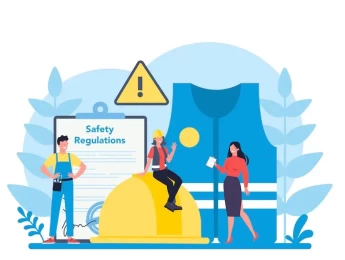Corporate governance is essential within all companies to keep processes on track and help employees complete their roles successfully. Many businesses are also highly regulated, and they cannot complete certain aspects of their operations without first following their governance procedures.
Auditing your governance processes will allow you to stay on track and grow whilst adhering to your legal responsibilities and regulations. You’ll also be able to monitor processes and determine risk areas to help make positive changes and apply best practices.
To conduct an accurate audit and move forward, all IT processes, administration procedures, and health and safety guidelines must be clear and monitored. You will also need to review your Corporate Social Reputation (CSR) in the community and as an employer to help you maintain a good reputation in supporting the rights and well-being of your employees.
Upon completion of this course, participants will be able to:
- Audit your corporate governance process.
- Monitor and evaluate risk areas.
- Make changes to processes to mitigate risk.
- Understand what good looks like and create business aims focusing on key areas.
- Assess sustainability, social and environmental factors when moving forward with the business.
- Work with the Audit Committee (AC) to achieve corporate governance.
- Create joint ventures through the development of mutually beneficial relationships.
- Manage stakeholder expectations of the future of the business.
- Use accurate forecasting measures to determine the next sensible steps.
- Develop an effective continuity plan to reduce the risks of service failure.
- Educate and support employees in corporate governance auditing procedures.
This course suits anyone responsible for auditing processes within an operation and assessing risk areas based on accurate analytics. it would be most beneficial for:
- Business Owners
- Directors
- Lead or Senior Auditors
- Those Managing Stakeholder Relationships
- HR Professionals
- Planning Managers
- Risk Assessors
This course uses a variety of adult learning methods to develop a full understanding of the internal governance auditing process. Participants will discover the correct development procedures and auditing requirements to ensure a business adheres to legal requirements and safeguards its employees.
They will participate in group exercises and decision tree roadmaps to clearly set out the expectations of a governance audit and identify risk areas within real-world operations.
Day 5 of each course is reserved for a Q&A session, which may occur off-site. For 10-day courses, this also applies to day 10
Section 1: The Key Elements of Corporate Governance
- What does corporate governance mean to your business?
- The 6 core governance principles.
- Governance flags.
- Your accountability.
- Terms of reference development.
Section 2: Managing Stakeholders
- How to meet stakeholder requirements.
- Key stakeholders including regulators, board level, auditing committee, and suppliers.
- Risk controls and metrics.
- Internal and external controls.
Section 3: Assessment Techniques & Tools
- The guide to IA standards.
- Your corporate governance statements.
- COSO advisory papers.
- Your 3 lines of defence.
- International vs. national governance.
Section 4: Analysing Your Audit Effectiveness
- Your internal controls and management.
- Relaying your expectations.
- Reinforcement and training to the employee population.
- Objectives and risk identification.
- Your auditing techniques.
Section 5: Preparing For Your Audit
- Assigning authority and responsibility.
- Governance oversight effectiveness.
- Establishing monitoring processes and performance measures.
- Trigger events.
- Your governance structure and outputs.
Section 6: Requirements in Your Audit
- Electing a leadership structure.
- Whistleblowing processes and delegated authorities.
- Your policy review.
- Escalation procedures.
- Considering the environment and meeting your obligations.
- Understanding sustainability.
Section 7: Board Risks & Review
- The key role of the board during auditing.
- Determining the causes of risk.
- Gathering evidence for investigation.
- RM capabilities.
- Risk management using ISO 31000.
- Review your risk register.
- Perceived vs. actual control measures.
Section 8: Your Overall Management Process
- Recruiting and retaining your staff.
- Risk appetite and incident repair.
- The culture of your organisation and communication.
- IIA Standard 2110 re-auditing and ethics.
- CSR wider aspects.
Section 9: Auditing Reputation
- Audit committee checklist and reporting.
- Identifying and managing your reputation.
- The magnifying effect of business failures on your reputation.
- How to increase your positive image.
- Judging your reputation based on other perspectives.
Section 10: IT Governance
- GTAG - The Global Technology Audit Guides.
- Your IT audit universe and responsibilities.
- CoBIT and ISO 27000.
- The Risk-Based Audit of General Controls (GAIT).
Section 11: Joint Venture Governance
- Risk strategies for JV.
- Termination of contracts.
- Financial agreement planning.
- Decision-making processes and SLAs.
- Adding value to your contracts and rationale.
Section 12: Business Continuity & Ongoing Evaluation
- Business continuity planning essentials.
- Disaster recovery processes,
- Understanding levels of risk and recovery.
- Transitions from emergency to disaster.
- Communication procedures and testing.
Upon successful completion of this training course, delegates will be awarded a Holistique Training Certificate of Completion. For those who attend and complete the online training course, a Holistique Training e-Certificate will be provided.
Holistique Training Certificates are accredited by the British Assessment Council (BAC) and The CPD Certification Service (CPD), and are certified under ISO 9001, ISO 21001, and ISO 29993 standards.
CPD credits for this course are granted by our Certificates and will be reflected on the Holistique Training Certificate of Completion. In accordance with the standards of The CPD Certification Service, one CPD credit is awarded per hour of course attendance. A maximum of 50 CPD credits can be claimed for any single course we currently offer.
- Course Code IND17-107
- Course Format Classroom, Online,
- Duration 10 days














